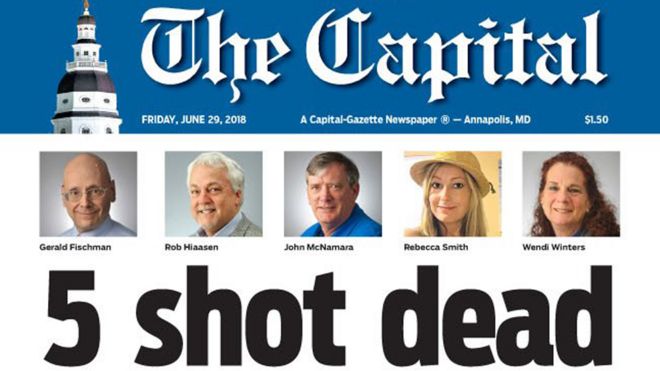1-800-366-3383
customerservice@chalicepress.com
 Every mass shooting hurts, but the murder of five people at the Capital Gazette, the newspaper serving the community of Annapolis, Maryland, stings in a particular way. As a former journalist whose career started in newspapers, I envision the horror in Annapolis set in the newsroom of the Edmond (Okla.) Evening Sun or the Miami (Okla.) News-Record or the Columbia Missourian. In the mid-Nineties, our newsrooms were wide open, easily accessible, and completely unsecured. Yet the spookiest thing I could imagine was somebody stumbling in and awkwardly bending my ear for half an hour.
Every mass shooting hurts, but the murder of five people at the Capital Gazette, the newspaper serving the community of Annapolis, Maryland, stings in a particular way. As a former journalist whose career started in newspapers, I envision the horror in Annapolis set in the newsroom of the Edmond (Okla.) Evening Sun or the Miami (Okla.) News-Record or the Columbia Missourian. In the mid-Nineties, our newsrooms were wide open, easily accessible, and completely unsecured. Yet the spookiest thing I could imagine was somebody stumbling in and awkwardly bending my ear for half an hour.
This could be a discussion about gun violence or mental health or the current morass that is political discourse. But I’m writing as someone whose vocation is under siege, and in Annapolis, under fire.
Journalism is a deep part of me. It’s been 30 years since I decided I wanted to be a journalist, and that decision has defined who I am. It determined where I went to college, how my family took shape, where I worked, where I lived, what some of my favorite entertainment is, and indirectly where my son will begin studies in about six weeks.
Despite the politically driven rhetoric that undermines the profession, what you should know about journalism is that every true journalist aims to tell a true story that will help readers see their world more clearly. The pay stinks, the hours are awful, the job stability is non-existent, and the subject matter could be terrible – take it from a former police reporter who covered months-long murder trials – but journalism serves a purpose: Helping a community understand what happened, or what might happen.
Most reporters never reach a stage big enough to make a huge difference on major issues. They’re simply at school board and city council meetings, taking photos of gap-toothed elementary students at their art fair, covering 8-man football in tiny towns, telling you where the police cars and fire trucks were heading, or introducing you to the fascinating people who live in your community and make it a better place.
Beyond that, though, journalism taught me to see the world differently. It helps me think critically, see beyond what’s presented to me, to think about who else might understand an issue I’m examining, and to build connection.
Journalism and religion have the same goal: To seek truth. Different flavors of truth, to be sure, but both journalism and religion, when practiced well, ask big questions and try to find the truest answer possible. It doesn't always come, and journalism and religion sometimes make mistakes. When we recognize mistakes, we own up to them.
At Chalice Press, we aim to share the truth of God as our authors best understand it. Our books are, in a sense, long-form journalism. An author researches, documents, and interprets information on a specific topic, and we help the author share that information. Interpretation is where disagreement can arise. You may not agree with what you read, but we hope you will at least consider the possibilities.
And don’t let the politicians and pseudojournalists who scream “fake news!” convince you journalism is evil. They have an agenda, which true journalists do not. I highly doubt anybody at the Capital Gazette singled out their future killer. If anything, when somebody cries out as fake news, pay attention – that news may be truer than they want you to believe.
This morning, the Capital Gazette put out their daily edition. God bless them and those who have rallied around them. They work with heavy hearts, but they also work with the determination to make the world a better place and to find the truth. Which is, in a way, a prayer. To which I say, Amen.